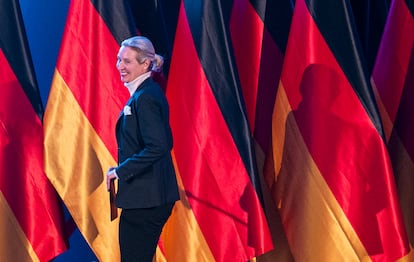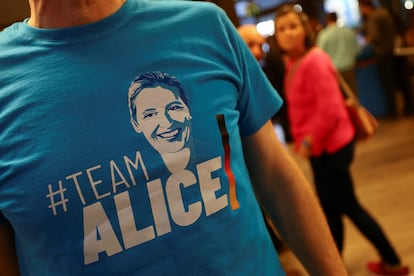Alice Weidel, a far-right profile that breaks the mold
The AfD leader maintains a discourse that contradicts her personal life but is allowing her to gain ground among a German electorate concerned about immigration


Alice Weidel, Alternative for Germany’s (AfD) candidate for German chancellor, is the antithesis of everything you might imagine a far-right leader to be. Her party advocates the traditional family of a man and a woman, but she is gay and is raising two adopted children with her partner. When she takes to the stage, she delivers a German nationalist discourse, calling for closed borders and an end to globalization, but she spends most — or almost all — of her time in another country. The AfD wants to deport thousands of foreigners en masse, but Weidel’s civil union partner, film producer Sarah Bossard, is originally from Sri Lanka.
If there is one thing that defines the 45-year-old candidate, it is these contradictions and the way she juggles her political and personal life in public. Nothing about her is typical of a party whose electoral base is made up mainly of low-income conservative men from the former East Germany. A self-confessed admirer of Margaret Thatcher, she is what these voters supposedly despise: a posh former banker raised in the West, cosmopolitan and multilingual, whose profile would not be out of place in those parties that AfD considers the cause of all the ills that afflict Germany.
Weidel has been in leadership positions in AfD since 2017. But “for most people she remains an enigma,” says Julie Kurz, a political journalist for public broadcaster ARD who has followed her and the party for the past five years. For Kurz, too, despite having met the far-right leader dozens of times, with the camera on and off, “she is a person with many layers, and she uses them as she pleases. She is different in an interview than in an informal chat. Sometimes she is trying to seduce you; at other times, she seems to be acting.”
Weidel’s many faces are intriguing in a country not accustomed to atypical leaders like her. “Who is she really? What are her motivations?”, ask the documentaries and profiles published in Germany.
The AfD leader grew up in Harsewinkel, a small town between Münster and Bielefeld in the state of North Rhine-Westphalia. Her school yearbook from her teenage years in Versmold has survived, in which her classmates describe Lille — her nickname at the time in 1998 — as a girl with a “dominant character” and sometimes “explosive” who liked to ride her bike. A report broadcast last Sunday on the public channel ZDF focused on a sentence written about her, in a style that was both ironic and admiring, by one of her friends: “I have never seen anyone who tells a lie with such somnambulant imperturbability as you do, without showing the slightest sign of anxiety.”
After studying economics and business in Bayreuth, where she later earned her doctorate, Weidel embarked on an international career that took her abroad (she spent six years in China working for the Bank of China). She was also an analyst in Frankfurt for firms such as Goldman Sachs and Allianz. In 2013, she joined the newly founded Alternative for Germany. In her only book, published in 2019, she recounts that it was her partner who encouraged her to join a party because she was constantly criticizing the way Germany was going and complaining about its political class.
This is how she came to join AfD, a party that was liberal and Euroskeptic at the time, but which has become more radical and evolved toward rejecting immigration. But how did a former banker in a same-sex relationship with a woman born in Sri Lanka become the key figure of AfD? Party leader Beatrix von Storch gave some clues when she said that Weidel proves that they are a “super-tolerant” party. “We have no problem with her way of life. We are tolerant of her and she of us. We accept her,” she says.

“Remigration”
Von Storch has a figurine of Javier Milei holding a chainsaw on the desk in her small office in Berlin’s Prenzlauer Berg district, with the words “Long live freedom, damn it.” She declares herself a fan of the Argentine president, who she says is “setting an example for the whole world.” “He has cut government spending by a third and his popular support is growing,” she says. Reducing the size of the state is one of AfD’s goals, although it is its immigration policies that are making headlines. Weidel has been more outspoken than ever at rallies lately, shouting the word “remigration” (a politically and historically charged concept in Germany) as a solution to the country’s security problems.
Kurz, a journalist from ARD’s central offices on the banks of the Spree with a direct view of the Reichstag, asks why Weidel did not leave the party as most of its founders did when it became more radicalized. It is a rhetorical question. “What really motivates her is power,” she says. “I think she saw an opportunity to climb to the top.” “I am not here despite my homosexuality, but because of my homosexuality,” the far-right leader declared in 2017.
Nor does Kurz believe that the harsh anti-immigration discourse of recent times is something new or forced by circumstances. “Her criticism of Islam goes back a long way. In 2018, she attacked immigration in the Bundestag, which she says has brought burqas, ‘veiled girls,’ and ‘knife-wielding men’” to Germany, expressions with very negative connotations. Her relationship with Björn Höcke, the controversial leader of the party in Thuringia and the most radical of its leaders, has also changed over time. In 2017, she wanted to expel him from the party; today, she has grown accustomed to his presence to the point of holding rallies alongside him.
Weidel is trying to normalize the party while radicalizing it further, a move that is paying off. The latest polls give AfD up to 22% of the votes in next Sunday’s elections, which would put it in second place. She will not govern; the other parties maintain a firewall, or “cordon sanitaire,” against the extreme right. Something “necessary” in Germany, said Olaf Scholz last week in response to U.S. Vice President J. D. Vance, who had called for collaboration with the extremists. “AfD is a party from whose ranks the crimes committed by the Nazis are trivialized. The commitment to ‘never again’ is not compatible with support for AfD,” said the chancellor.
Von Storch describes Weidel as “very intelligent, very capable, brave.” “You can talk to her; she has a sense of humor,” she adds, in response to the question about what she is like when she is not giving a rally. Reserved could be another adjective that defines her, although her partner has posted videos on social media of them both dancing in the car or in relaxed scenes that have little to do with her public image.
When she has a prepared speech, Kurz says, Weidel appears confident and self-assured. In interviews, however, when she has to improvise, she seems uncomfortable. She was uncomfortable on Monday, for example, when several citizens asked her during a live broadcast about the inconsistency of being a lesbian in a homophobic party. She appeared upset.
She also took David Gebhard’s questions for a ZDF documentary poorly. The journalist accompanied her to Überlingen on Lake Constance, where she has her electoral district and, in theory, resides. But she could not say how many inhabitants the district has, not even approximately (it is 250,000), while several locals claim they have never seen her there. Weidel maintains that she lives between Switzerland — where she is raising her children with Bossard — and the German city, which is relevant because an elected official must reside in the country. The journalist asked her how many nights she thinks she has spent there in the last year, to which Weidel angrily replied: “I am not going to answer what you are asking me.” And then she walked away, visibly upset, toward the lakeside.
Sign up for our weekly newsletter to get more English-language news coverage from EL PAÍS USA Edition
Tu suscripción se está usando en otro dispositivo
¿Quieres añadir otro usuario a tu suscripción?
Si continúas leyendo en este dispositivo, no se podrá leer en el otro.
FlechaTu suscripción se está usando en otro dispositivo y solo puedes acceder a EL PAÍS desde un dispositivo a la vez.
Si quieres compartir tu cuenta, cambia tu suscripción a la modalidad Premium, así podrás añadir otro usuario. Cada uno accederá con su propia cuenta de email, lo que os permitirá personalizar vuestra experiencia en EL PAÍS.
¿Tienes una suscripción de empresa? Accede aquí para contratar más cuentas.
En el caso de no saber quién está usando tu cuenta, te recomendamos cambiar tu contraseña aquí.
Si decides continuar compartiendo tu cuenta, este mensaje se mostrará en tu dispositivo y en el de la otra persona que está usando tu cuenta de forma indefinida, afectando a tu experiencia de lectura. Puedes consultar aquí los términos y condiciones de la suscripción digital.








































